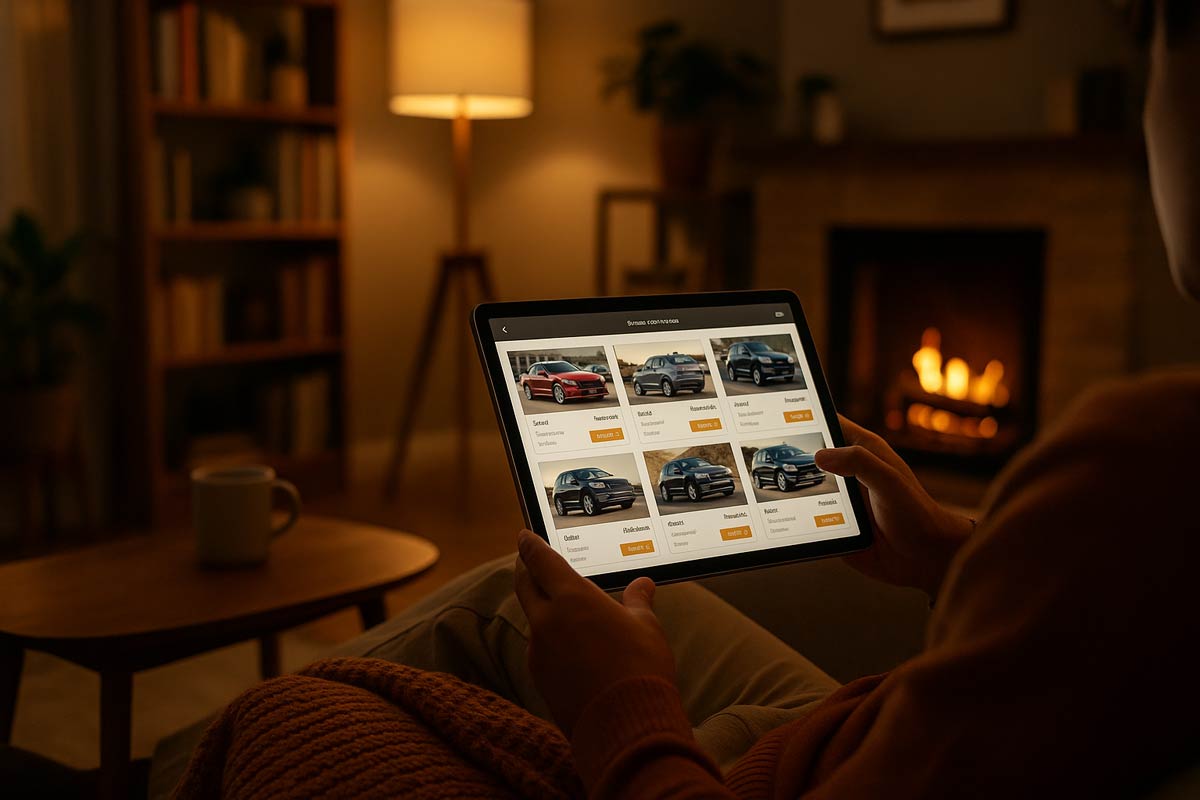 https://auction.ridesafely.com/images/2026/02/wholesale-vs-retail-pricing-auction-cars-banner.jpg
865
1440
RideSafely
/images/2025/01/ridesafely-logo.svg
RideSafely2026-02-12 15:01:162026-02-12 18:48:44Wholesale vs Retail Pricing: Auction Cars Explained
https://auction.ridesafely.com/images/2026/02/wholesale-vs-retail-pricing-auction-cars-banner.jpg
865
1440
RideSafely
/images/2025/01/ridesafely-logo.svg
RideSafely2026-02-12 15:01:162026-02-12 18:48:44Wholesale vs Retail Pricing: Auction Cars ExplainedOnline car auctions have turned a once-local, dealer-centric world into an open marketplace you can access from your couch. But convenience doesn’t remove responsibility, especially when bids are binding and vehicles are sold “as is, where is.” Solid research is the difference between a smart buy and an expensive lesson. This guide gives you a simple, step-by-step framework to evaluate any listing and bid with confidence.
Why Research Matters Before You Bid
Buying a car online isn’t like adding sneakers to a cart. Once the gavel falls, you own a vehicle that might be sitting three states away and needs a trailer, a title transfer, and repairs. A few hours of research can save thousands in surprise costs.
Before you even place your first bid, it’s important to understand who can buy at online car auctions—as eligibility rules can vary between platforms and states.
“As Is, Where Is”: What That Means
You’re accepting current condition and current location. No test drive. No promises beyond what’s disclosed. If the listing says “no keys,” assume you’ll need new keys and programming. If it says “does not run,” budget for tow-out and diagnostics. Clarity up front prevents regret later.
Common Myths About Buying Cars Online
- Myth: If it looks clean in photos, it’s good to go.
- Reality: Cameras can’t capture hidden issues—undercarriage, electronics, or flood markers.
- Myth: A clean title means perfect condition.
- Reality: A clean title can still hide mechanical trouble or cosmetic repairs.
- Myth: The hammer price is the cost.
- Reality: Add buyer fees, taxes, shipping, and repair parts to know the real number.
Define Your Goal and Budget
Start with intent. Are you after a commuter, a project, an export, or a parts donor? Your goal filters the search, shapes your budget, and narrows your risk tolerance.
If you’re planning to purchase without dealer credentials, you can still buy vehicles at auctions without a bid card or dealer license, but you’ll want to factor in the process and possible restrictions.
Use-Case First: Daily Driver, Flip, or Parts
- Daily Driver: Favor low risk—clear disclosures, running condition, and verifiable maintenance.
- Flip: Target cosmetic damage with clean mechanicals and strong resale comps.
- Parts: Focus on drivetrain and component value vs. body condition.
Total Cost of Ownership vs. Hammer Price
The winning bid is only the first step. Your total outlay includes fees, logistics, and repairs that can dwarf a “deal” price.
Fees, Taxes, Shipping, and Repairs
Expect: buyer fee, internet fee, document fee, taxes/registration, yard storage (if you’re late), transport, and shop labor. For repairs, get parts pricing now—control modules, airbags, ADAS calibration, and paint materials add up fast.
Know Your Title Types
Title status decides what you can legally do with the car and how insurers will treat it. Title branding can have a huge impact on value and registration. See our detailed breakdown of 10 vehicle title types explained to know exactly what each status means before bidding.
Clean, Salvage, Rebuilt, and Export-Only
- Clean: No branding. Best for easy registration, but still vet condition.
- Salvage: Deemed a total loss; typically needs inspection to be road-legal.
- Rebuilt/Reconstructed: Salvage repaired and inspected. May affect resale and insurance.
- Export-Only: Not eligible for on-road use domestically; usually for parts or overseas buyers.
Impact on Insurance and Registration
Some carriers won’t fully cover rebuilt cars or will limit comprehensive coverage. Your state’s inspection steps vary; confirm requirements before you bid.
Decode the Listing Like a Pro
A great listing is your remote inspection. Read every line.
High-Resolution Photos and 360° Views
Use all angles. Zoom into panel gaps, windshield corners, seat mounts, rocker panels, trunk wells, and underhood fasteners for signs of prior repairs. 360° views help you spot mismatched paint, overspray, or misaligned bumpers.
Engine Start and Walkaround Videos
If a video shows cold start, listen for lifter tick, belt squeal, or timing chain rattle. Watch the dash for warning lights. Note idle quality and exhaust smoke.
Run & Drive, Keys, Odometer, and Warning Lights
- Run & Drive: Usually means the engine starts and vehicle moves under its own power at the yard. Not a full-road test.
- Keys: No keys = towing plus locksmith/programming costs.
- Odometer: Compare to vehicle age, wear on pedals/seats/wheel, and service stickers.
- Dashboard: ABS, SRS, and CEL lights signal extra diagnostics and cost.
Red Flags: Flood, Airbags, Frame, and Theft Recovery
- Flood: Silt in seat tracks, moisture under carpet, rust on seat frames, water lines in trunk.
- Airbags: Deployed airbags are expensive; seatbelt pretensioners may also be spent.
- Frame: Kinked rails, wrinkled aprons, or uneven tire wear hint at structural damage.
- Theft Recovery: Missing modules, cut harnesses, or damage to ignition/column.
Leverage Digital Tools for Due Diligence
You don’t need a lift or a lab—use online tools and third-party help.
For salvage opportunities, you might even turn profits while you learn by starting with lower-cost vehicles and building experience through smaller projects.
VIN Decoding and Vehicle History Reports
Run VINs through reputable decoders and history services to check prior accidents, mileage records, liens, and past registrations. Verify trim level to price parts and options correctly.
Market-Price Benchmarking and Comp Sets
Pull resale comps from marketplaces and auction results. Compare like for like: year, trim, miles, condition, title status. Use comps to determine your maximum bid.
Third-Party Previews and Inspections
If you can’t go in person, consider hiring a local inspector to photograph the undercarriage, scan the OBD-II, and confirm the engine/transmission behavior. A $150–$400 inspection can save thousands.
Location Logistics and Storage Rules
Distance isn’t a dealbreaker—just plan it.
Pickup Deadlines, Storage Fees, and Yard Hours
Most yards give a short free pickup window after payment. Miss it and storage fees stack daily. Confirm yard hours and release requirements (ID, release form, tow appointment).
Shipping Quotes: Open vs. Enclosed, Domestic vs. Export
For runners, open transport is usually fine. For high-value or exposed components, consider enclosed shipping. Export buyers should plan for drayage, port handling, and customs paperwork.
Bidding Tactics That Win (Without Overpaying)
You’re not just bidding—you’re negotiating with your future self. Discipline beats impulse.
Pre-Bid, Live Bid, and Proxy Strategies
- Pre-Bid: Set the tone early and gauge interest.
- Live Bid: Expect flurries as the timer resets.
- Proxy: Enter your ceiling and let the system auto-bid—great for avoiding emotion.
Sniping vs. Steady Increments
Sniping (late bids) can work on lower-interest lots, but steady, small increments reveal resistance points. Watch patterns; if increments jump quickly, competition is serious.
When to Walk Away
If total cost exceeds your resale value or repair budget buffer, stop. There will always be another car.
Budget Math: A Quick Estimator
Use a simple formula to keep yourself honest:
Estimated Total = Hammer Price + Buyer Fees + Taxes/Title + Transport + Storage (if any) + Parts + Labor + Contingency (10–15%)
If that number doesn’t make sense for your goal, don’t bid.
Calculating your maximum bid is easier when you can determine how much a salvage title car is worth using market comps and realistic repair estimates.
From Research to Keys-in-Hand
Online Car Auctions — Research-to-Delivery Checklist
| # | Stage | What to Do | What to Verify | Helpful Tools | Pro Tips |
|---|---|---|---|---|---|
| A | Define goal & budget | Decide use-case (daily driver / flip / parts) and set a total cost ceiling. | Goal clarity, max total spend incl. contingency (10–15%). | Budget spreadsheet, TCO calculator. | Work backward from resale/value; set a hard walk-away number. |
| B | Shortlist vehicles | Filter by year, trim, miles, title status, location, and keys/run status. | Listings match your criteria; parts availability for the trim/engine. | Marketplace filters, parts catalogs (OEM/aftermarket). | Favor popular trims/colors for easier resale and cheaper parts. |
| C | Decode listing (photos, 360°, videos) | Zoom through all images; watch walkarounds/engine-start clips. | Panel gaps, rust, flood markers, warning lights, interior wear. | Hi-res gallery, 360° viewer, video player. | Compare disclosures vs. visuals; note anything unexplained. |
| D | Verify VIN & history | Run VIN decode and history report; confirm trim/options. | Accident records, odometer continuity, title brand, liens. | VIN decoder, vehicle history report, OEM build sheet. | Check theft/flood zones and prior auction appearances. |
| E | Estimate costs (fees, shipping, repairs) | Itemize buyer fees, taxes, transport, storage, parts & labor | Written transport quote; parts pricing; shop rates/lead time. | Fee schedule, shipping marketplace, parts sites, labor guides. | Add 10–15% contingency; include ADAS calibration if airbags/bumper work. |
| F | Optional: third-party inspection | Hire local inspector to scan codes, check fluids/undercarriage. | OBD-II report, extra photos (frame rails, seat tracks, trunk well). | Inspection services, OBD-II scanner report. | Mandatory for high-value or unclear listings; cheap risk reduction. |
| G | Set max bid & proxy | Enter a proxy bid at or below your ceiling; avoid emotional bidding. | Max hammer price aligns with TCO cap and comps. | Auction proxy bidding, comp sheet. | Round to odd amounts to beat common round-number ceilings. |
| H | Win auction & pay | Pay within the platform’s deadline (often same/next business day). | Payment confirmation, receipt, release/gate pass | Wire transfer, cashier’s check (per rules). | Late payment can trigger penalties or relist—move fast. |
| I | Arrange pickup/shipping | Book transport; schedule yard pickup within free window. | Driver assigned, pickup time, insurance, BOL. | Auto transport marketplace, carrier COI. | Confirm yard hours and ID/release requirements to avoid storage fees. |
| J | Title & registration steps | Track title shipment; plan salvage/rebuilt inspection if applicable. | Correct buyer name, title brand, needed forms/fees for your state. | DMV site, rebuild inspection checklist. | Photocopy all docs; check lien release; mind export-only restrictions. |
| K | Repairs & final QC | Order parts, complete repairs, align/ADAS calibrate, test drive. | No warning lights, straight alignment, no leaks/overheating. | Shop work order, scan tool, alignment/calibration reports. | Re-scan after road test; verify key count and remote functions. |
| L | Drive, sell, or part out | Choose end strategy; document work for resale value. | Photos, receipts, inspection report for buyers/insurers. | Marketplace listing templates, photo kit. | Good documentation boosts sale price and buyer confidence. |
Quick Formula: Estimated Total = Hammer Price + Buyer Fees + Taxes/Title + Transport + Storage (if any) + Parts + Labor + Contingency (10–15%)
How to Compare Two Similar Cars
Let’s say you’ve found two Toyota Camry listings with similar miles.
Scorecard: Condition, Costs, Risk, and Resale
Create a simple score out of 100 across four pillars:
- Condition (30 pts): Start/run, warning lights, interior wear, panel alignment.
- Costs (30 pts): Total all fees, shipping, and realistic repairs.
- Risk (20 pts): Title status, flood exposure, airbag/frame events.
- Resale (20 pts): Market comps, color/trim desirability, maintenance records.
Higher total wins—even if the hammer price is slightly higher—because net outcome matters.
Payment, Paperwork, and Post-Auction Steps
Win secured? Great. Now move fast.
How and When to Pay
Most platforms set strict payment windows. Wire transfer is standard; some accept cards for deposits only. Delays can trigger penalties, relist fees, or loss of deposit.
Title Transfer and Documents
Ensure the name on your account matches your titling needs. Track title shipping and keep copies of the bill of sale, release documents, and gate passes. For salvage vehicles bound for rebuild, research your state’s inspection checklist now.
Risk Management and Buyer Protections
Auctions are not retail showrooms. Protect yourself through information and process.
Arbitration (When Offered) and Limitations
Some venues offer limited arbitration for major undisclosed issues—but many salvage sales exclude it. Assume responsibility for your due diligence and bid accordingly.
Warranties? Not Here—Plan Accordingly
Budget for the unexpected: sensors, modules, batteries, cooling components, or ADAS calibration. Consider a professional post-repair inspection for safety systems.
RideSafely Tools That Speed Up Research
Efficient research is about clarity, not guesswork. RideSafely centralizes the data you need to make informed decisions.
IAA 360 View™ and IAA Engine Starts™ Video
Use 360° imagery to spot panel inconsistencies and cabin wear. Engine start videos help you evaluate idle quality and warning lights from your screen—crucial when you can’t visit in person.
Vehicle Details Page: Specs, Photos, and Disclosures
Dig into the Vehicle Details Page for option codes, condition notes, title status, keys availability, and location. Match disclosures against visuals; if anything doesn’t line up, ask before you bid.
Quick-Start Checklist
- Define your use-case and ceiling price.
- Read the entire listing—twice.
- Inspect all photos and 360° views; watch start/walkaround videos.
- Run the VIN through decoders/history services.
- Price out parts and estimate labor.
- Get transport quotes and confirm yard pickup rules.
- Consider a third-party inspection for high-value targets.
- Set a proxy max bid and stick to it.
- Pay promptly and schedule pickup to avoid storage fees.
- Handle title/registration steps early; plan repairs and quality checks.
Conclusion
Online car auctions reward preparation. When you define your goal, verify title status, dissect photos and videos, run the VIN, price out repairs, and respect your budget, you shift the odds in your favor. Use the digital tools at your fingertips—high-resolution imagery, 360° views, engine start videos, and transparent Vehicle Details Pages—to build a complete picture before you bid. Whether you’re chasing a daily driver, a profitable flip, or a parts donor, disciplined research turns a risky click into a confident purchase.
Online Car Auctions: Quick FAQs
How do I set a smart maximum bid?
Work backward from your total cost ceiling. Add fees, shipping, expected parts/labor, and a 10–15% contingency. Whatever remains is your max hammer price—set it as a proxy and don’t exceed it.
Are salvage cars ever worth it for a daily driver?
Yes. Cosmetic or light mechanical salvage can be repaired economically, but confirm parts pricing and your state’s inspection requirements. Insurance coverage may be limited on rebuilt titles.
What’s the fastest way to spot a flood car in photos?
Zoom in on seat tracks, under the spare tire, lower door cards, and trunk wells. Look for corrosion, silt, water lines, or mismatched interior hardware. Check for a musty interior and fogged cluster lenses in walkaround videos.
Do I need a third-party inspection if videos are available?
For higher-value lots, yes. A local inspector can scan codes, check fluids, photograph the undercarriage, and validate what the camera misses. It’s cheap insurance.
How long do I have to pick up a vehicle after winning?
Policies vary, but the free window is typically short. Confirm yard hours in advance and schedule transport immediately to avoid storage fees.






Leave a Reply
Want to join the discussion?Feel free to contribute!